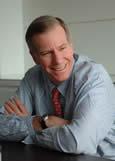
“The crisis has created an opportunity to re-think the content of traditional MBA programmes,” says Julie Battilana (PhD 2006), Assistant Professor of Business Administration at Harvard Business School. “And it’s highlighted the limits of financial logic that’s been dominating us for the last 10 years.”
Battilana and Johanna Mair (PhD 2000), Associate Professor in the Strategic Management Department at IESE in Barcelona, are teaming up in a research project on organisational change management, to investigate what is largely a corporate response to the current economic malaise.
“The crisis brought out certain issues that were never before addressed: the increase in immigrants, unemployment,” says Mair. “These are issues that the World Bank and NGOs (non-governmental organisations) cannot address, so we are looking at what kind of company effects change. We’re not interested in organisational change per se, but in organisations that actually become levers or engines for broader change on the social, economic and environmental front.”
“We are looking at change that breaks with existing institutions,” says Battilana. “Venture philanthropy, social entrepreneurs. And so far we are finding lots of them – more than what we’ve traditionally found at the World Economic Forum (in Davos). Some are below the radar screen. We want, through our project, to bring them to the radar screen.”
Marc Le Menestrel (PhD 1999), Associate Professor at Universitat of Pompeu Fabra in Barcelona and a visiting Professor of Ethics at INSEAD, and Gabriel Szulanski (PhD 1995), Professor of Strategy at INSEAD, teach – in essence – decision-making. LeMenestrel focuses on the content; Szulanski on the process.
“I am interested in ethical values, in whether a company makes ethical decisions,” says Le Menestrel. “We have taken polls of students recently about why and how companies are ethical; we look at the unethical side of business, and this becomes rather emotional. We look at the trade-offs between making money and ethical issues.”
“I still put emphasis on the making of strategy,” says Szulanski, who believes these tools are transferable, regardless of the changing circumstances in which they are applied. “The theory is that paying attention to the process will help you make better decisions. Managers may not be able to do right, but they can do a lot of wrong.
Understanding the process can help you make better decisions. In fact, research completed sometime in June shows that after the financial meltdown, managers were saying that they were dissatisfied with the way they plan, that they want to learn about strategy and better planning.”
Le Menestrel agrees business schools need to focus more on the art of decision-making. “My PhD thesis was on the Processes and Consequences of Rational Behaviour,” he says. “Business today needs to deliver more than economic value; it must take into account more diversified expectations of stakeholders. The traditional economic system is better at estimating the size of the cake rather than how to share it.”
Luc Wathieu (PhD 1995), Associate Dean of Faculty at the European School of Management and Technology (ESMT) in Berlin and a specialist in consumer behaviour with 10 years’ teaching at the Harvard Business School under his belt, says he’s talking more in the classroom about new challenges to companies. “The consumer feels more empowered today, and he or she wants more transparency from companies with which they do business. They expect to see some social responsibility on the part of these companies.”
Wathieu questions the next generation of business school programmes. “The MBA isn’t such a strong proposal these days,” he says. “We may have to find new avenues – executive education programmes, for example.”
Szulanski applies his theories on decision-making to finding the way forward for business educators and students alike. “Taking people out of their daily lives to focus on the process doesn’t always work,” he admits. “You’ve got to have heart. That’s the fuel to keep you going until you reach a resolution. The more heart, the more change.”
And how can the student benefit from these heady times, when the establishment is called into questions, new ideas are circulating and old tools are finding new uses? “The success of the student is directly tied to the number of good ideas he or she is associated with,” says Bart Bronnenberg (PhD 1994), Professor of Marketing at Tilburg University in the Netherlands, and a former UCLA professor. “You need good researchers – people you can work with and co-author papers with; if you’re lucky you’ll form a group that might be remembered for creating a particular paradigm. Be as ambitious as possible. If that means going somewhere else, go: reach as high as possible.”
INSEAD celebrated the 20th anniversary of its PhD programme with a reunion at the school’s Europe campus in Fontainebleau on June 25, 2009.
-
View Comments
-
Leave a Comment




No comments yet.